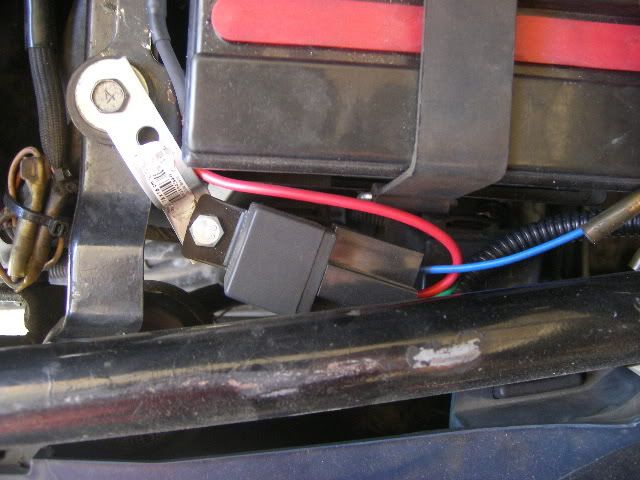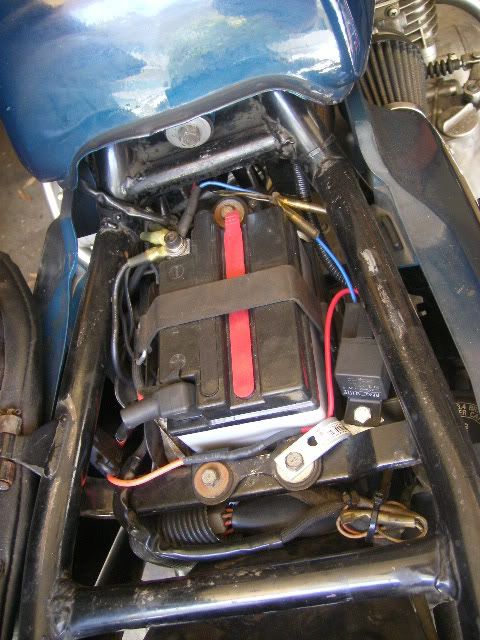Announcement
Collapse
No announcement yet.
Coil Mod Relay Location Question
Collapse
X
-
 propflux01
propflux01
Coil Mod Relay Location Question
On my GK, I installed 2 automotive horns and bracketed them just fwd of the engine, using the original horn mount locations. I used a relay and holder to operate these horns. The relay I located under the tank, almost in the same place that is show in Basscliffs site. however, it seems the heat from the engine coming up under the tank has killed two of these relays. I then relocated the relay to the front of the bike, just fwd of the instruments. It has not failed yet, and has been there approximately one year. While I have no issues with ignition or performance that I am aware of, I want to do the coil relay mod for PM purposes. However, I don't want to put it under the tank, as the last thing I want to happen is it to go out on me while I am riding! What is the prospect of putting it near the battery cage, near where the flasher relay goes? I am asking this because the Basscliffs site thread says to install it close to the coils.Tags: None
-
 spyug
spyug
Mine is fairly new too about 1000km. I mounted it underneath the right rear of the tank and accessible with the side panel off. I wanted to be able to get to it easily if it crapped out. A side benefit is that it is away from most of the engine heat so it should last longer. It seems to work fine so I don't really see the need to mount it close to the coils.
I carry a spare just in case.....the old boy scout in me.
Cheers,
Spyug
-
 BassCliff
BassCliff
Hi,
I put the relay for my coil relay mod under the left side cover. I put it there so that it would be easier to take it out of the circuit should it fail (although I do keep an extra around). I made a little jumper so that I could restore the original connections right there under the right side cover, without taking off the tank. Here you see the relay and inline fuse to the right of the fusebox...

The two lower red wires run up under the tank and connect to the coil wires.
Thank you for your indulgence,
BassCliff
Comment
-
 seuadr
seuadr -
 propflux01
propflux01 -
mine are also mounted under the side covers on both my 850GL & 550L.
No problems as of yet.
I think the main issue is to get a weather-proof relay that's sealed all around the case to prevent water/moisture from getting in. AutoZone sells them for about $5 each - work great.
BTW - I love your new avatar '85 GS550L - SOLD
'85 GS550L - SOLD
'85 GS550E - SOLD
'82 GS650GL - SOLD
'81 GS750L - SOLD
'82 GS850GL - trusty steed
'80 GS1100L - son's project bike
'82 GS1100G - SOLD
'81 GS1100E - Big Red (daily rider)
Comment
-
 lucabond
lucabond
I mounted mine to the right of the battery box so the inline fuse i have on the circut is handy. Also you may want to put a zip tie around the relay and holder just for insurance it will not come loose. Good luck.
Comment
-
I don't remember who it was, but I saw a post recently where someone had installed the relay near the battery box, but used the original wires for the third leg of the stator to minimize the number of wires he had to run. He connected the coil wire to one of those (former) stator wires and then connected that to trigger the relay. He then connected the output of the relay to the other (former) stator wire and ran that to power the coils. The only problem I see with that is that you will have a few more connections in the circuit, and that's what we are trying to minimize, and you will also be using a wire gauge that will be just barely adequate to carry the load you will be asking. I think it's better to run a new 12- or 14-gauge wire from the relay to the coils and avoid the original bike wiring. It would be OK to use a (former) stator wire to trigger the relay, though. That way, you would only have to run ONE wire up to the front.
.sigpic
mine: 2000 Honda GoldWing GL1500SE and 1980 GS850G'K' "Junior"
hers: 1982 GS850GL - "Angel" and 1969 Suzuki T250 Scrambler
#1 son: 1986 Yamaha Venture Royale 1300 and 1982 GS650GL "Rat Bagger"
#2 son: 1980 GS1000G
Family Portrait
Siblings and Spouses
Mom's first ride
Want a copy of my valve adjust spreadsheet for your 2-valve per cylinder engine? Send me an e-mail request (not a PM)
(Click on my username in the upper-left corner for e-mail info.)
Comment
-
Forum LongTimerGSResource Superstar
Past Site Supporter- Oct 2006
- 13969
- London, UK to Redondo Beach, California




I have about 7k miles or so with it like this... It is isolated by both the length of the metal bracket & the battery box rubber. Less bumpy at the centre of the bike in theory too & no heat....
I had to run one wire up to the coils & loop it across. Tacked into the O/W wires (old coil feed) up under the fuel tank too.
Dan1980 GS1000G - Sold
1978 GS1000E - Finished!
1980 GS550E - Fixed & given to a friend
1983 GS750ES Special - Sold
2009 KLR 650 - Sold - gone to TX!
1982 GS1100G - Rebuilt and finished. - Sold
2009 TE610 - Dual Sporting around dreaming of Dakar..... - FOR SALE!
www.parasiticsanalytics.com
TWINPOT BRAKE UPGRADE LINKY: http://www.thegsresources.com/_forum...e-on-78-Skunk/
Comment
-
The mounting of the relay as described provides a double level of shock/vibration isolation. The battery box is mounted in rubber, and the relays are mounted on a flexible plastic (flap) mount off the battery box. While being in front of the engine might be cooler, the battery area is not so hot as to be problematic for a mechanical relay.Originally posted by Steve View PostI don't remember who it was, but I saw a post recently where someone had installed the relay near the battery box, but used the original wires for the third leg of the stator to minimize the number of wires he had to run. He connected the coil wire to one of those (former) stator wires and then connected that to trigger the relay. He then connected the output of the relay to the other (former) stator wire and ran that to power the coils. The only problem I see with that is that you will have a few more connections in the circuit, and that's what we are trying to minimize, and you will also be using a wire gauge that will be just barely adequate to carry the load you will be asking. I think it's better to run a new 12- or 14-gauge wire from the relay to the coils and avoid the original bike wiring. It would be OK to use a (former) stator wire to trigger the relay, though. That way, you would only have to run ONE wire up to the front.
.
As far as excess connection dropping voltage to the coils, I have removed the ignition switch, start switch and fuse box from any voltage drops to the coils. Since wire length or the size of the wire is seldom the issue with voltage drop but rather it is poor connections or corroded switches, I saw no compromise in locating the relay at the battery box(i.e. teh distance does not create voltage drop due to the length of wire).
In terms of excess connections, the only excess connection is the OEM crimp pins in the igniter 4 pin connector. Since I had a new OEM harness and had cleaned that igniter 4 pin connector there is little if any benefit from running a direct wire from the relay output directly to the two coils. The approach powers the entire OEM ignition circuit with the ignition relay without suffering the above voltage drops (save for the one additional connection).
Last edited by posplayr; 08-06-2009, 04:04 PM.
Comment
-
Forum LongTimerGSResource Superstar
Past Site Supporter- Oct 2006
- 13969
- London, UK to Redondo Beach, California
Steve is talking about Posplayr install I think.. he didn't want to butcher his new loom.
Dan 1980 GS1000G - Sold
1980 GS1000G - Sold
1978 GS1000E - Finished!
1980 GS550E - Fixed & given to a friend
1983 GS750ES Special - Sold
2009 KLR 650 - Sold - gone to TX!
1982 GS1100G - Rebuilt and finished. - Sold
2009 TE610 - Dual Sporting around dreaming of Dakar..... - FOR SALE!
www.parasiticsanalytics.com
TWINPOT BRAKE UPGRADE LINKY: http://www.thegsresources.com/_forum...e-on-78-Skunk/
Comment
.png)
.png)
Comment